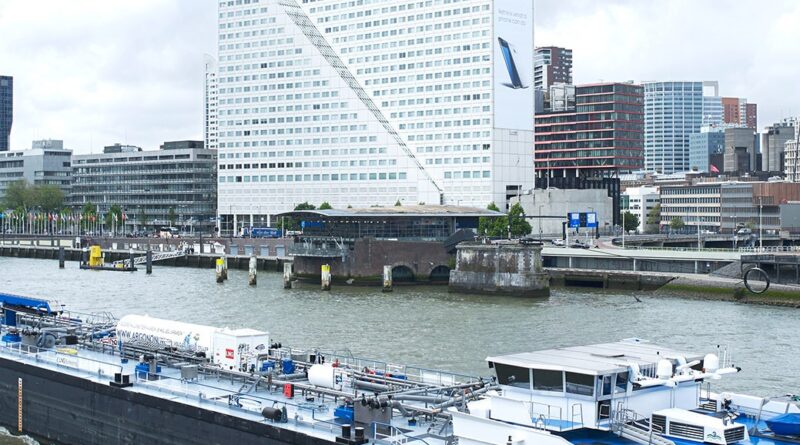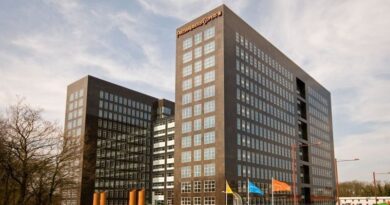Ortec Finance Talks Real Estate
For this issue of Nekst, we had the pleasure to interview Coen Ravesloot from Ortec Finance. Ortec Finance is a leading provider of technology and solutions for risk and return management in different industries all over the world. As the name already reveals, it used to be part of Ortec. More than 10 years ago, they split into an independent firm: “The only things we still have in common with Ortec are: our name and logo style”, Coen said. Luckily for us, he has a lot of interesting things to tell us about Ortec Finance and his role in the company. Written by: Tamara Dert and Aimee Smarius
Could you tell us a bit about yourself and how you ended up at Ortec Finance?
“I have been working for Ortec Finance in the real estate department for about three years. How I got there probably started with my choice of study. I was interested in both mathematics and economics, so econometrics was the perfect combination. That is why I started my Bachelor Econometrics at VU Amsterdam. I did not know anything about the ICT side of econometrics and was very surprised to get courses in programming. To be honest, I started studying econometrics without knowing what job I wanted to do later. I decided to do a Masters in the subjects of Operations Research and Econometrics, in the latter I also wrote my thesis. I actually came into contact with employees of Ortec Finance during the ‘Landelijke Econometristen Dag’ (National Econometricians Day), and we had an instant click. I decided that I wanted to join Ortec Finance and started at the real estate department. I did not know anything about real estate, but to be honest, there is no university study that focuses on this. I saw this opportunity as a fun challenge, but it required approximately 1.5 years to read up on the material. Throughout the process, you gain more and more responsibilities. Also, a lot of econometricians already worked at Ortec Finance and were willing to help me during the onboarding process.”
Can you tell us what your function within the real estate department of Ortec Finance entails?
“There are two types of real estate, there is commercial real estate and social real estate (e.g. social rental housing or student housing). Ortec Finance provides different model solutions that support the composition of budgets, market values, simulations, and risk analyses. We focus on housing associations that have to buy a license for a solution in order to use these models. In general, we support approximately 90% of the market. The market is quite regulated by our government, so we also have to keep close contact with the Ministry of the Interior and Kingdom Relations. We also conduct independent research for them, we do for example calculations for the ministry to predict the outcome of proposed regulations in the real estate sector. Furthermore, Ortec Finance is of course active in the consultancy branch: we support companies that we work with to solve their problems. I am a real estate consultant and therefore I mostly focus on giving calculated advice about issues. Additionally, I am working in the research department of Ortec Finance. I think that this ongoing process of solving issues presents you with many challenges, and these challenges in return allow you to develop yourself continuously.”
With what kind of people and structure do you work?
“We have a lot of very smart people, mostly econometricians and software developers, but we are also always on the lookout for mathematicians and others with degrees in beta studies, like technical physics and computer science for instance. In the end, Ortec Finance believes that these degrees indicate that you are capable of learning and making the right connections. Together with the structure and training that Ortec Finance provided, these people can really flourish.
Within Ortec Finance, we have less of a top-down hierarchy than other companies that I have come to know. Immediately at the beginning, I received a lot of responsibility and everyone was really helpful. We mostly work in teams of about eight people. Such a team is then responsible for one or two solution models from A to Z. Within the team, we have smaller project groups that tackle specific problems and tasks. The members of these small teams are interchanged often, making sure you learn rapidly, as you have to work with people from all kinds of backgrounds.”
Can you give us an impression about a week in your life?
“Last week was very hectic since we are busy doing research for the ministry. I have been busy drawing up the solution model and making calculations for several regions. The main question that I worked on is, whether there is enough money to pay for the sustainability task that housing associations have. A little while ago, some of the national research that I did, was published and was shown in the news. Usually, the tasks during my week are more diverse: one day a week I work as a kind of helpdesk. Customers with questions about the model or about the extra applications can then call for direct advice or support.
Normally, we work 40 hours a week and we do not work overtime. So, every extra hour you put into your work after hours is voluntary. In my free time, I enjoy playing padel. After work, I often play a match against a colleague at the court next to the office. Besides that, I also play indoor football once every 2 weeks. When I was a student, I played indoor football on a really high level at a club in ‘t Groene Hart. Ortec Finance also has a staff association that organizes all kinds of activities. Here you can meet colleagues from the other departments and get to know them a little better. The activities focus on having fun. Ortec Finance even has an annual winter sports vacation that every employee can join.”
Ortec Finance has offices all around the world and works internationally. Do you often collaborate with these offices or other firms?
“Ortec Finance is indeed located in Toronto, London, Hong Kong, Melbourne, and Zurich. Nonetheless, our department is situated in the Netherlands (i.e. Amsterdam and Rotterdam) as we only serve Dutch housing associations. Ortec Finance of course also has clients like banks, insurances, pension funds, and gives advice on investment decisions. The departments dealing with these clients operate and collaborate with other countries. Due to the many departments that Ortec Finance has, there are many possibilities for switching functions without leaving the company.
The real estate department of Ortec Finance where I work does not collaborate a lot with other firms. However, we work closely with client firms and have partners that we can use as an extra set of hands. These partners are trained by us and are mostly consultancy firms that sell our solution models to smaller clients. This way we can keep our focus on innovation and creating the best solution models possible. At the moment, we do not have a lot of big partners, nor big competitors, but with this strategy we focus on our biggest assets: our smart people and our brand are known to be big, trustworthy, and experienced. Right now, this seems to pay off as we hold a big part of the market share in the Netherlands in the markets where we have solution models.”
How has it been working for Ortec Finance during the COVID-19 pandemic and how do you see the future?
“Within my department, it is going very well; we are doing better than ever. However, as Ortec Finance we are feeling the effects of the pandemic. We see that Ortec Finance still gets steady incomes out of the licenses that last multiple years, but for now, we see that many client firms seem to roll back on their innovation. Often, we help these firms with consultancy, and therefore we now lose some of our work. For some time last months, there was a stop of new hires and all other procurement projects, but now we are slowly starting to look at the possibilities to restart these things. My department, for example, has definitely proven itself very profitable, even during the COVID-19 crisis and therefore has been granted permission to start hiring again.
For the distant future, I think that we, as the real estate department of Ortec Finance, are safe. Even if everything will be automated and done by computers, consultants are still needed to give advice. Since we also have a lot of analysts who know about both the market and the technology, our department is a proven and useful addition to Ortec Finance.”
Have you ever considered a different path for your career, like getting a PhD and becoming a researcher?
“I never really considered studying further by doing research at the university. I think this was a good decision as I would miss the contact with the client, and research seems to be a lot less dynamic than my current job. In fact, I am now switching a bit towards the Advice & Research department of Ortec Finance. I guess in a way, I became somewhat of a researcher after all but in a different setting. For the future, I think that for me, the most important thing is to have a challenging job. I really admire people that know everything about a certain sector, like Johan Conijn for example. He knows everything about the market and is a real expert in his field. The feeling of being so good at what you do, is something that I would love to have. For now, I am pleased to be in a role that is mostly about implementing the solution. Maybe someday, when I have seen more, I would like to have a more executive role to oversee the bigger picture.”
How many econometricians are working for Ortec Finance and why is Ortec Finance so interesting for econometricians?
“Econometricians are everywhere in Ortec Finance. The department where the least econometricians work is the real estate department, where I work. Making budgets is not necessarily something for econometricians, but doing risk analyses definitely is. The other departments use more econometric models, that is why more econometricians and mathematicians work there.
Besides, Ortec Finance is a very versatile company and stimulates its employees to experience this themselves. You are welcomed to see and work alongside other departments and really use what you have learned during your studies. Some departments use econometrics to build models to predict the future, but there are also departments that make more use of quantitative finance to perform risk analyses. Switching departments is not an odd thing to do at Ortec Finance. A second great selling point is the people that already work here. Ortec was founded by university students and has always kept close ties with universities to keep the input of young minds and shape them with the experience that we have kept over time. Most people in my team are in their early 30s, I think.”
Do you have a last piece of advice to give to econometrics students who are getting ready for the labor market?
“Make sure you know what you want to learn. Grasp the opportunities such as internships, traineeships, but also smaller things like the study association events to see, talk, and have a try in all kinds of different settings. This is, I think, the best way to find what suits you and maybe even more important: what does not. When you start to work, either as an intern or as a starter, it is crucial that you are fearless in asking questions that may feel stupid. I can tell you right now that making mistakes because of bad assumptions is far worse. By being honest to the people around you and giving yourself some time to learn, you will do great in no-time.”




